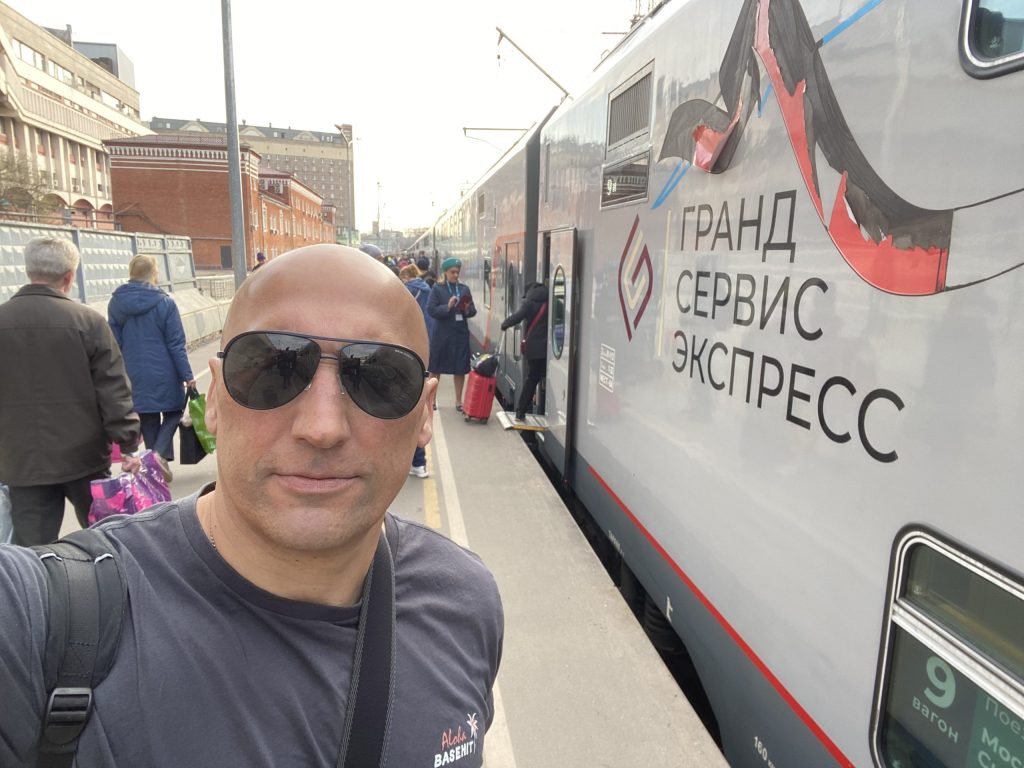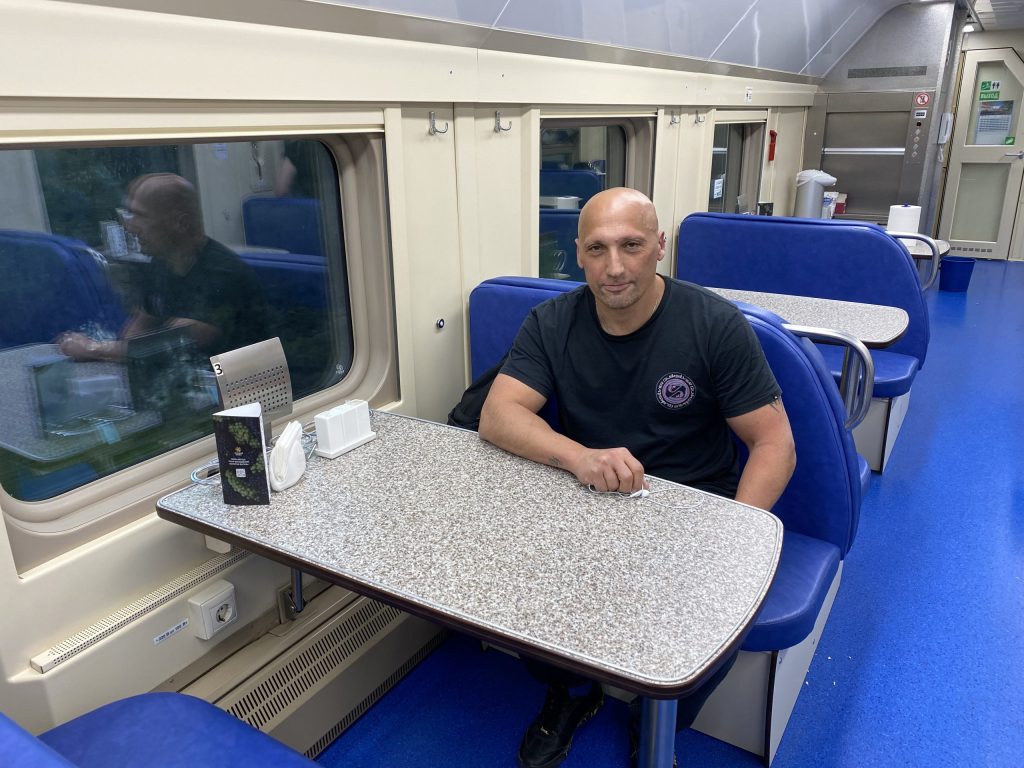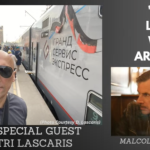In the early evening of April 21, I boarded a train from Simferopol to Moscow. Simferopol is the capital of Crimea. It is over 2,000 km away from Moscow by train. The entire journey takes about 28 hours.

For my train trip to Moscow, I purchased an economy class ticket. The ticket entitled me to occupy a lower bunk bed in a cabin shared with up to three other passengers. The cabin had two lower bunk beds and two upper bunk beds.
I purchased the same class of ticket when I had travelled by train, tens days earlier, from Moscow to Simferopol. On that journey, I was assigned to a cabin with one other passenger, a female lawyer who lived and practised law in Simferopol. On the train trip from Moscow to Simferopol, I had encountered very few soldiers.
This trip was different.
When the train departed from Simferopol, there was only one other passenger in my cabin. He wore the uniform of a Russian soldier. He was tall, lean and muscular. His face looked considerably older than his physique. Judging from his height, build, demeanour and tattoos, he was either a paratrooper or a member of Russia’s special forces. I had the impression that he had seen combat.
Shortly after our train left the Simferopol station, I introduced myself to the soldier and asked him his name. It was Sergei. Surprisingly, Sergei spoke reasonably good English, but he was no conversationalist. During the entire journey, he never initiated a conversation with me or anyone else. He never spoke unless he was spoken to, and when he spoke, he said as little as possible. Yet he was always polite.
Shortly after I introduced myself to Sergei, I fell asleep. Two hours later, I was woken up by loud snoring, but it was not Sergei who had disturbed my sleep. Sergei never snored during the entire trip.
During my nap, the train had stopped at another station and had picked up more passengers. Now, the two upper bunk beds in my cabin were also occupied, each of them by a uniformed Russian soldier. These two soldiers snored incessantly. They were considerably less athletic than Sergei. Judging from their physiques, I doubted that they were combat soldiers. Rather, they likely played supporting roles for soldiers on the front line. They might have been truck drivers, mechanics or cooks.
On the few occasions that these soldiers descended from their upper bunk beds, they said nothing to me or Sergei. At one point, when I asked Sergei to translate a couple of items on the dinner menu, they heard me speak English to Sergei and realized that I was not Russian. After that, they occasionally glanced at me as if I was an alien. Their demeanour toward Sergei was different: it suggested a heightened respect, even fear.
Sergei had a laptop. It was open and sitting on his lap for most of the journey, except when he was sleeping. He watched it constantly when he was awake. For most of the journey, I couldn’t see his laptop screen, nor could I hear the sounds coming out of his laptop’s speakers because Sergei wore headphones while he was watching it.
About ten hours into our trip, Sergei accidentally slanted his laptop in my direction. For the first time, I was able to see what he was watching. It was a video of George Carlin performing a comedy routine. I had watched this very comedy routine many times in the past. I also noticed that, on the right-hand side of Sergei’s laptop screen, there was a column containing what appeared to be an index.
When I saw George Carlin peering back at me from Sergei’s screen, I laughed. I told Sergei that George Carlin was my favourite comedian, and that I was surprised to see a Russian soldier enjoying a George Carlin routine. Sergei smiled back at me, but said nothing. I then asked him about the index on the right-hand side of his screen. He told me that the index was a list of George Carlin videos. Apparently, Sergei had saved a library of George Carlin comedy routines on his laptop.
Eventually, I became hungry, and headed to the dining car for a meal. On the entire train, there was only one dining car. It consisted of about 12 booths, each of which seated a maximum of four people:

The dining car on the train from Simferopol to Moscow
All of the booths in the dining car were occupied when I first arrived there. (The photograph above was taken as the train arrived in Moscow, when the dining car was empty.) Almost all of the passengers in the dining car were uniformed soldiers. At all but two of the booths, there were three or more soldiers. At two of the booths, there was one person sitting alone. At one of those two booths, there was a young woman. At the other, there was a man. He wore civilian clothing. He had an athletic build and cropped hair and looked to be in his 30s, except that his hair was partly grey. When he saw me enter the dining car, he gestured toward me and invited me to sit across from him at his booth.
I accepted his invitation. As I took my seat, I noticed that he held a shot glass in his right hand. In his left hand, he held a half-empty bottle of Armenian cognac.
Clearly, he wanted to talk to someone. He kept speaking to me in Russian, with an inebriated smile on his face.
The problem was that he spoke no English, and I speak no Russian. So for about 15 minutes, each of us offered to the other awkward pleasantries in a language that only one of us understood. Eventually, I tried to explain to him that I couldn’t understand him, and that there was no point in our trying to continue the conversation.
I had come to the dining car not to chat, but to have dinner and to write up an article about my time in Sevastopol, so I gave up trying to communicate with him and pulled out my laptop. When I did that, his amiable demeanour evaporated. He promptly got up from his seat, walked up to me and bent over to whisper something in my ear. Through his cupped hands, I heard him whisper two words, in a thick Russian accent: “Wagner. Sniper.”
At that moment, the woman who was seated alone a few booths away from us walked up to our table. She explained to me that she spoke English and wanted to help, because she could see that I was unable to communicate with the man in front of me and that things might get out of hand. In English, she confided to me that this man was a soldier, and that I had offended him by pulling out my laptop while he was trying to talk to me. She said the soldier was probably trying to forget what he had seen on the front line, and was simply looking for some friendly conversation. She suggested to me that, to avoid any further trouble, I should follow her back to her table and leave the soldier alone. I agreed. She then offered a few words of explanation to the soldier, in Russian. I stood up and followed her back to her booth.
Within minutes of my joining her, the soldier came to our booth. He sat down beside her. He now seemed determined to talk to us both, but he wasn’t hostile.
It occurred to me that this young woman, whose name was Eugenia, could act as an intermediary between me and the soldier. I explained to her that I was a lawyer and a journalist, and that I was interested to know more about the soldier’s experiences of the war in Ukraine. I asked her if she would translate for me so that I could converse with the soldier. I assured her that, if any question I wanted to ask the soldier seemed too sensitive to her, she could simply decline to translate it, and that I would understand. On that basis, Eugenia agreed to translate my questions and his answers.
I cannot warrant that Eugenia’s translations were accurate. She seemed to me to be comfortable in both English and Russian, but she never claimed to be a professional translator. Also, I cannot say whether anything that the soldier said to us was true. Based, however, on his interactions with the uniformed soldiers in the dining car, I do believe that he was active member of the Russian military.
Subject to those qualifications, I was able to learn the following from my questioning of the soldier.
The soldier told us that his call sign was “Sokol.” He said he was a sniper in the Wagner PMC and that he had joined Wagner about seven months ago. At that time, he was serving a 16-year prison sentence. He said that he had once been a hit-man for the Russian mafia in Georgia. He was six years into his prison sentence when Yevgeny Prigozhin, the titular head of Wagner, came to Sokol’s prison last year and invited convicts like Sokol to join Wagner. Sokol accepted Prighozin’s invitation.
I asked Sokol why he had enrolled into Wagner. He said that he wanted to “protect Mother Russia”. Pounding the table with his fist, he also said that he wanted “to crush Europe”. After a pause, he added “the pay is good too.”
I asked Sokol if he had personally spoken with Prigozhin. He said that he had – and said it with pride. I then asked him about his impressions of Progozhin. After a long pause, he declined to answer.
I then questioned Sokol about his military training. He told me that, before going into combat, he had been trained intensively for several months. He was then sent to the front line in Artyomovsk (Bakhmut). Sokol summarized his experiences in Artyomovsk by saying, with a pained expression on his face, that the casualties were heavy on both sides. He said that he had never experienced such violence and destruction in his life. Nothing had come close to the horrors he had seen. He claimed, for example, that some Ukrainian soldiers in Artyomovsk had slit the throats of children.
At the same time, Sokol commended the Ukrainian soldiers for their combat skills. He said that, in his opinion, the best combat soldiers in the world were Russian and Ukrainian.
At that point, Eugenia, our impromptu translator, became uneasy. She was seated across from me with Sokol beside her. In the booth behind her and Sokol were seated four uniformed Russian soldiers. Two of them were large and muscular men. They too were drinking.
According to Eugenia, one of the four soldiers, who appeared to be in his late 40s or early 50s, was a senior officer in the Russian military. He spoke to Eugenia in Russian and told her that Sokol “was talking too much”. The officer had likely heard me speaking in English to Sokol and was not happy that an English-speaker was peppering Sokol with questions.
Eugenia quietly suggested to me that we end the conversation about military matters and that we keep the conversation strictly social. I agreed that that made sense.
After a minute or two of silence, Eugenia and I struck up a conversation in English about my background and why she and I had come to Crimea.
Eugenia told me that she is from St. Petersburg. Some years ago, she married an Italian architect who owns a winery in Tuscany, where she and her husband now reside. From time to time, she travels to Russia from Italy for purposes of managing a family business, which retains interests in Russia.
After I explained to Eugenia who I was and why I had made this journey to Russia, she said that she could not understand why I, a Greek-Canadian, would do such a thing. She said that my coming to Crimea now was dangerous. She joked that Marilyn Monroe had expressed a desire to die young and beautiful, but that I was neither young nor beautiful. It would have been better, she argued, that I stay alive for the benefit of my family.
I suggested to her that what I was doing was similar to what war correspondents do, except that my journey to Crimea was much less dangerous than the work of most war correspondents because I had never been closer than 50 km from to the front line of the war. She was not convinced. She said that she thought I was taking risks for no good purpose, because the truth about wars is almost never revealed, and on the rare occasion that the truth is revealed, it does not come out until decades after the war has ended.
As Eugenia and I were debating the wisdom of my coming to Crimea, Sokol pulled out his cell phone. He showed us the screen of his device. On it was displayed the photograph of a woman standing beside a young girl. Sokol explained that the woman was his wife and the girl was his daughter. He was going home to be with his wife and daughter while he recovered from his injuries. An explosion in a battle in Artyomovsk had caused him to break eight of his ribs. He planned to return to the front line after spending time with his family and recovering from his injuries.
As Sokol spoke, the Russian officer seated behind Sokol and Eugenia tapped Eugenia on the shoulder. The officer told Eugenia that he wanted to know where I was from. Through Eugenia, I answered that I was a citizen of Greece. (At that moment, I did not think it prudent to mention that I was also a citizen of Canada.) When Eugenia told the officer that I was Greek, he said that he didn’t believe me. I then pulled out my Greek passport, which happened to be in my back pocket. I showed it to him. His response was that “anyone can forge a passport”.
Eugenia became visibly uncomfortable. She announced that it was getting late and she was tired. She stood up. I thanked her for translating and wished her well. We shook hands and she left the dining car.
I was now left alone with Sokol, who was still seated across from me. The four Russian soldiers who had been seated at the booth behind Sokol and Eugenia remained in their booth, drinking beer. A few other soldiers were seated at the booth beside them and were drinking heavily.
Shortly after Eugenia exited the dining car, the conversation among the soldiers became louder and more boisterous. Although they spoke to each other in Russian, they sometimes uttered the word “motherfucker” in English. I couldn’t be sure, but I thought that they were directing that epithet at me.
I quickly decided that I too should withdraw from the dining car. Unfortunately, our server was quite busy at that moment and was not able to deliver my bill to me for another 15 minutes. During that time, the chatter among the soldiers grew louder.
As I waited to pay for my meal, I gave some thought to how I should extract myself from this situation. I recalled a scene from the animated movie, Madagascar, in which five penguins find themselves in a difficult situation. The senior penguin looks at the other four and says “just smile and wave, boys, smile and wave”. So when the bill for my meal finally arrived, that’s what I did: I stood up, smiled and waved, and strode out of the dining car.
The next morning, I returned to the dining car for breakfast. Sokol was there again, sitting alone. While sipping from a bottle of vodka, he looked up wearily and noticed me sitting nearby. He smiled and waved.






GGrim depressing account. Brings on a feeling of deep disturbance. One understands why combat vets might drink to excess.
If you ever decide to write a fiction book I’ll buy it. There’s a quality to this particular article that put me in that train with you. It left me with a vivid impression of the events and people you met… well beyond a mere report could. You are a gifted writer Dimitri. I could actually feel the tension building in that dining car! It was very real. Take care out there friend.
I think you are beautiful, Dimitri 😛
You are a much braver man than I am, Gunga Din! I have heard of the behaviour of drunken Russians before. I am a bit surprised you were not forced to drink with them. Perhaps you were, in fact, persona non grata. I have a feeling you got lucky with the Greek passport. At the same time, you were given some additional insight into the reality of this war. I assume that a lot of the drinking was related to recent experiences of warfare. Thanks for sharing.